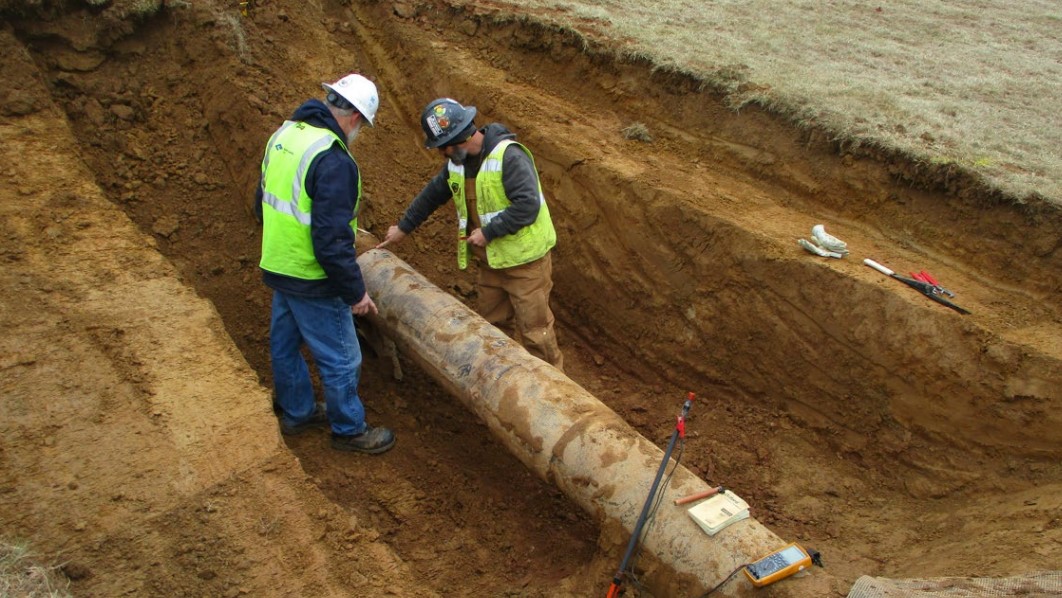Jet fuel leaking from a Bucks County pipeline has directly impacted fewer than a dozen wells, but it has caused widespread concern — and anger — across the Upper Makefield community.
That anger was on display Thursday night at Sol Feinstone Elementary in Newtown during a contentious and crowded meeting where residents and elected officials called on Energy Transfer/Sunoco to shut down the pipeline entirely.
The Twin Oaks pipeline, which carries jet fuel from Delaware County to Newark, N.J., remains active with a 20 percent reduction in pressure, after the company repaired the leak.
The release of the jet fuel was confirmed on Jan. 31, impacting some residents in the Mt. Eyre Manor neighborhood, officials said. Out of 359 wells tested, six were found to contain hydrocarbons above statewide health standard amounts, while four others had lesser amounts, company officials said during a presentation.
That was cold comfort to the families directly affected or to the community members who said they’d been smelling and tasting gas in their water for months.
One of those residents is Kristine Wojnovich, who said the pipeline company told her in 2023 that there was no leak and that the odor she was experiencing could have been caused by bacteria. The company did a dig near the home looking for a leak and none was found.
Now jet fuel has been found in her well.
“To date, they recovered more jet fuel from my property than anywhere else,” she said. “Not just measurable. Feet of jet fuel.”
“Described to residents as a slow drip, explain to me how wells, with five, six or 12 feet [of jet fuel] in them, could possibly have been detected shortly after it began?” she asked.
Energy Transfer Vice President of Public Affairs Joe McGinn apologized for the jet fuel leak and said the company’s “focus and goal is to restore the community to its original state.”
The company has installed full point-of-entry water treatment systems (POET) for the six wells that tested above the statewide health standard. It is also offering water testing at cost for the area.
Energy Transfer is also providing bottled water for residents, has purchased a house at 108 Spencer Road, and has posted a website to share information with concerned residents.
Project Manager Matthew Gordon said company officials are continuing to inspect the pipeline.
“We hear you, and we’re taking steps to clean this up and make sure the pipeline operates safely,” said Gordon. An ultrasonic tool will be used inside the pipeline to find cracks.
Brian Jimenez, director of pipeline safety, said Energy Transfer is working on a full remediation plan that it will share it with the United States Department of Transportation’s Pipeline and Hazardous Materials Safety Administration (PHMSA), the federal agency in charge of pipelines.
A third-party company is doing an investigation to find out how the leak occurred in the 105-mile-long Twin Oaks pipeline.
Not good enough, said Rep. Brian Fitzpatrick (R-Bucks), whose representative read a letter to the meeting.
“I will not stop until we get answers and accountability your families deserve,” the letter read. “From day one, I’ve been working to seek answers and transparency. While I appreciate the involvement of PHSMA and DOT, the answers we received do not go far enough…The answers we received so far are woefully short of transparent.”
“What we need as a community is clear: number one, the pipeline needs to be shut down,” he wrote. “Number two, water testing needs to be expanded and expedited. Lead and benzene need to be included and reported publicly.”
The Board of Supervisors voted unanimously for an ordinance directing Energy Transfer to shut down the pipeline.
Longtime pipeline opponent state Sen. Steve Santarsiero (D-Bucks) also called for a shutdown.
“This Twin Oak pipeline, they have had a problem, and they’ve not been effective in managing it. We need to shut this pipeline down. It needs to be shut down now.”
Resident Bryan Roberts said the pipeline is 67 years old, and the leak occurred at a type-A sleeve previously repaired 30 years ago. Those sleeves are known in the industry to be problematic, he claimed.
On Jan. 24, he said a resident had a private test performed on their well water that detected the jet fuel after Sunoco again failed to detect a leak, he said. When the company opened up the ground at the sleeve, it was found to be leaking. The company removed the leaking sleeve in the middle of the night, he said.
“Shut down the pipeline,” he said to applause.
The Newark airport is a key transport hub for New York City and the surrounding region, and commercial airlines rely on the fuel from the pipeline. And the Pennsylvania energy sector transports billions of dollars in fuels each year via the network of pipelines crisscrossing the state.
The Liquid Energy Pipeline Association reports incidents involving pipelines were down 23 percent over the five years 2019 through 2023, according to federal data. The pipeline association released a report that found operations and maintenance incidents impacting people or the environment declined 54 percent between 2019 and 2023. Also, total equipment failure incidents impacting people or the environment decreased by 50 percent during that period.
Residents can call a 24/7 community hotline: 877-397-3383.

